“Strategic Dialogue” Between Italy and Saudi Arabia

All Global Research articles can be read in 27 languages by activating the “Translate Website” drop down menu on the top banner of our home page (Desktop version).
***
The fact, that Matteo Renzi was received in Riyadh by His Royal Highness Prince Mohammed bin Salman and praised Saudi Arabia, aroused criticism. No criticism raised, however, but substantial consent, when Renzi himself, as President of the Italian Government and Secretary of the Democratic Party, in November 2015 went on an official visit to Riyadh to consolidate relations between the two countries. And at the time Saudi Arabia was substantially the same and had already started the war against Yemen. The visit was part of the traditional Italian policy of friendly relations with Saudi Arabia and the other Gulf Monarchies. Just recall Emma Bonino who, as Foreign Minister of Premier Letta’s Government, declared in 2013: “Italy and Saudi Arabia really have a lot in common and there are profound reasons for strengthening our ties.”
The visit that Foreign Minister Luigi Di Maio made to Saudi Arabia on January 10 (more than two weeks before Renzi) fits in the same line. Here he did not only meet Prince Mohammed bin Salman, extolling “the constant strengthening of friendship and cooperation relations,” but he performed a much more important official act: he signed with the Saudi Foreign Minister, Prince Faisal bin Farhan, a memorandum of understanding on the “strategic dialogue” between Italy and Saudi Arabia. This act, far more serious than Renzi’s declaration on the “New Renaissance” of Saudi Arabia, did not arouse criticism in Italy and practically passed over in silence.
The new agreement links Italy even more to an absolute monarchy, in which the Sovereign holds political and economic, legislative, executive, and judicial powers. It is currently in the hands of Prince Mohammed bin Salman, who seized power with an act of force within the ruling family. There is no Parliament in Saudi Arabia, only an Advisory Council appointed by the Sovereign. Political parties and trade unions are illegal. The judicial system is based on Quranic law, administered by religious courts. Frequent are the sentences of beheading or cutting off hands, carried out in public. Opponents and critics are jailed, tortured, and murdered. Journalist Jamal Khashoggi was killed in the Saudi Consulate in Istanbul and his body was dismembered to make it disappear. About 10 million immigrants, half of the workforce in Saudi Arabia, live in conditions of over-exploitation and slavery: over 4 million have been arrested in 3 years for alleged violations of immigration laws.
The “strategic dialogue” agreement strengthened the ties between the Italian military-industrial complex and Saudi Arabia, one of the biggest buyers of weapons. While the Italian government is revoking the sale of bombs to Saudi Arabia as a measure against Saudi Arabia’s war massacring Yemen, Leonardo, Italy’s largest military industry, is assisting Saudi Arabia in using the Eurofighter Typhoon fighters that bomb Yemen. Riyadh bought 72 fighters from the Consortium where Leonardo holds 36% of the industrial share. The Eurofighter Typhoon, as the manufactory industry itself certified, is “combat-proven” having already been “tested in operations in Libya, Iraq and Syria,” and Yemen must be added too. Leonardo itself documented that “for over 40 years we have supplied the avionics and communication systems of the Typhoon and Tornado operated by Saudi Arabia Royal Air Force ” and we offer the Saudi Arabia Royal Air Force aircraft without pilot and target acquisition solutions “(i.e. drones capable to identify targets to be bombed). Leonardo itself also stated that “we have personnel in the Kingdom’s military bases.” At the same time, the Italian Public Company Fincantieri is building in the United States 4 warships of the most advanced type (Multi-Mission Surface Combatants) for Saudi Arabia on the basis of a “multi-billion-dollar order.” There is, therefore, a solid foundation for the “strategic dialogue” development between Italy and Saudi Arabia.
*
Note to readers: please click the share buttons above or below. Forward this article to your email lists. Crosspost on your blog site, internet forums. etc.
This article was originally published in Italian on Il Manifesto.
Manlio Dinucci is a Research Associate of the Centre for Research on Globalization.
Featured image is CC BY-SA 4.0

